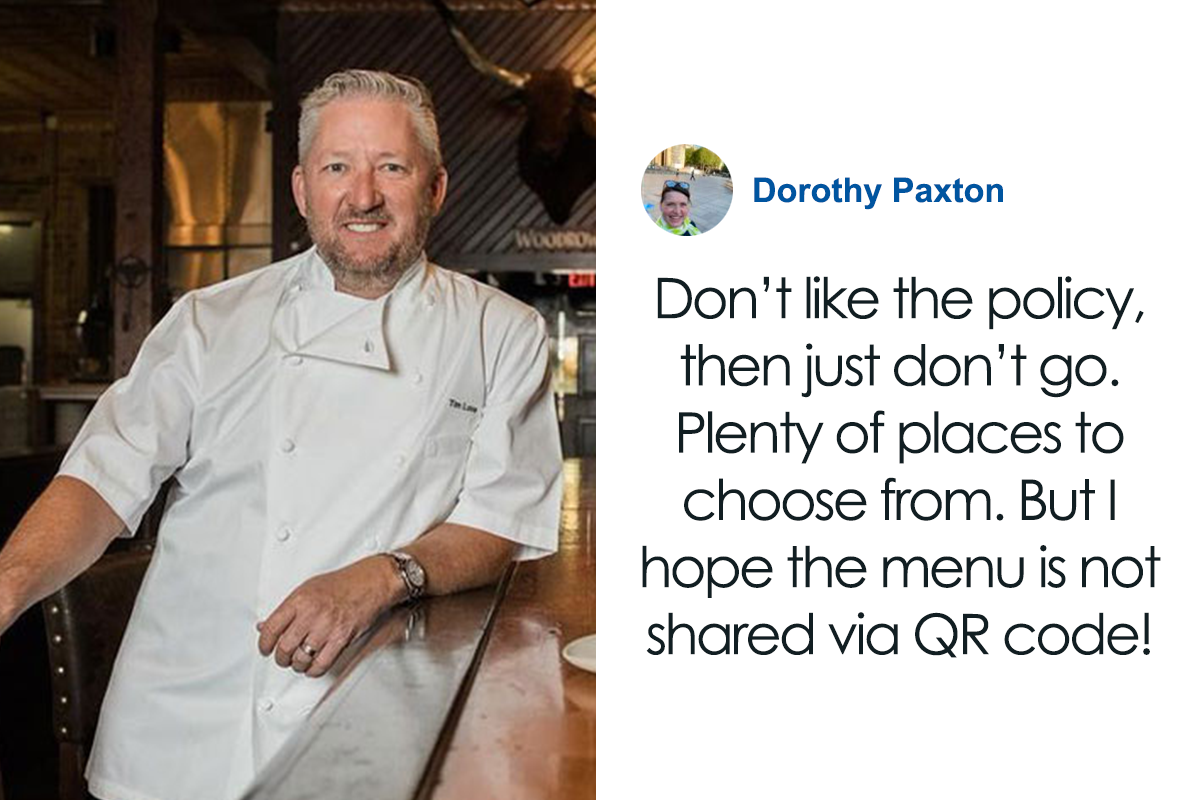
New Italian Restaurant In Texas Has A Strict ‘No Cellphones Allowed’ Policy, And It’s Divided The Internet
Touch it. Turn it. Buy it. Charge it. Lock it. Unlock. Snap. Text. Scroll. Scroll. Scroll. Like. Reply. Share. Scroll some more. Purchase. Email. Log in. Tweet. Message. Call. Tap. Unplug.
Silence. Check how much time has passed, and it’s already close to midnight. Your undrunk tea sits next to you, and you wonder what kind of whirlpool your mind has been trapped in for the past 5 hours; the constantly updating wonderland of nightmarish proportion. It’s addictive. It’s connective. It’s distracting. And many places have had enough of the side effects that smartphones bring along with them.
One such place is the recently established Italian restaurant called Caterina’s in Fort Worth, Texas, run by chef Tim Love. All guests will be required to leave their phones with the hostess or host at their arrival, as well as to follow a dress code. While some have praised such a notion, others have been noting failings in the philosophy. Let’s dive into it!
More info: Caterina’s Restaurant
Tim Love, a chef who owns several restaurants in the Fort Worth area, believed it was about damn time we enjoyed a smartphone-free dinner
Image credits: caterinasftx
Smartphones have truly been a miraculous invention, getting us all closer to one another than ever before. And yet, ironically, it’s all been a means of drifting apart. Why express your feelings when you can just google up a meme, and voila – all is clear and explained! We take pictures and videos of every single thing just to capture the moment and keep it forever. Forever locked up in the “Gallery” that is…
Some concert venues, comedy shows and restaurants have been taking steps in limiting smartphone usage with the hopes of encouraging people to enjoy the present moment and not be an annoyance to those next to them. Tim Love, a chef who owns several restaurants in the Fort Worth area, believed it was about damn time we enjoyed a smartphone-free dinner.
So he opened up an Italian restaurant called Caterina’s, where customers will be required to pack their phones away into small bags when sitting down to eat
Image credits: cheftimlove
Customers at his new Italian restaurant called Caterina’s will be required to pack their phones away into small bags before even sitting down to eat. “The hostess gives each guest a pouch to put their phone in and the pouch stays with the guest the whole dinner,” Tim told Paper City. “We’re going to kindly ask them to put their phone in the bag. […] We give them the bag. They put their phone in the bag. It’s not a big deal.”
If the guest is expecting a call or is nervous about missing one, the restaurant offers an old-school bright-red rotary landline. If a customer receives a call, the staff will walk over to their table with the phone. “And, if someone really needs to access their cell during dinner, they are welcome to simply walk outside to use it,” Tim assured.
A food blogger from Paper City asked: “What about people like me who want to take photos of the space and their memorable meal?” “We’ve already thought of that,” Tim replied. “We are going to send a follow-up email to all the reservations the next day, including a photo of everything they ordered. So they can share it online to their hearts’ content.”
If the guest is expecting a call or is nervous about missing one, the restaurant offers an old-school bright-red rotary landline phone, which they bring to the table
Image credits: caterinasftx
The idea is to create a place where people can disconnect and pay attention to their friends, fellow diners, the ambiance, and food without being distracted by technology. “If you can’t possibly deal without your phone for two hours, this is not the place for you,” Tim told NBC. “I mean, people go to movies, they don’t get on their phone.” But this isn’t the only rule at the restaurant.
The ’40s and ’50s-inspired restaurant, seating 40 guests at a time, wants to keep things classy with a strict dress code, with men required to wear sport coats. For those who forget, they’ll loan you a jacket at the front door.
Even the dinner’s pace is monitored as a means to help people relax. “Caterina’s guests will be treated to a multi-course meal,” Tim told Paper City. “It’s slow dining, or what I like to call analog dining where the entire experience encourages you to slow down. There will be lots of little surprises throughout the meal.”
The ’40s and ’50s-inspired restaurant wants to keep things classy, so men are required to wear sport coats. If one forgets, they’ll loan you a jacket at the front door
Image credits: caterinasftx
While this may encourage people to socialize, what should those people who prefer dining solo, reading books with their meals, and avoiding chatting to random strangers do? And what about those who need their cellphones to track their blood sugar levels or to keep in contact with loved ones, who at any moment might need their help?
These are some of the questions that came to people’s minds when they heard of this ban, and they led to a very interesting discussion on ableism and idyllic nostalgia. Let’s first break down the terms so that we can understand what we’re diving into.
Ableism, as described by Access Living, is the discrimination and social prejudice against people with disabilities based on the belief that typical abilities are superior, which encourages harmful stereotypes, misconceptions, and generalizations of people with disabilities.
One of the ways this can be seen is in venues that are inaccessible for a certain group of people, which in this case would be those who need their cellphones for health purposes or as a means of communication.
“I wanted to create a little jewel box,” Tim said. “A place where people could get dressed up, and enjoy a relaxed meal and good conversation”
Image credits: cheftimlove
Now, to jump to the other end of the discussion, nostalgia is a sentimentality for the past, typically for a period or place with happy personal associations. In this case, a time when people dressed in a certain type of way and had no cellphones to distract them from interacting with the world around them. Immediately we see one problem here – what if you don’t identify as a man, albeit looking like one and vice versa?
But the main question here is – should restaurants be banning cellphones? Matt Niehaus argues that it has its benefits and fallbacks. A more serene experience, encouraging one to unplug and unwind, is definitely on the positive list. In some cases, it might actually speed up the turnover of tables, allowing for more people to enjoy the space.
However, Matt believes it may also lead to a reduction in social media buzz, which may affect sales. Even if patrons of Caterina’s receive a picture of their meal post-event, will every person receive the same one, or will it be someone’s responsibility to take pictures of each and every meal? Furthermore, the enforcement of such a rule may be somewhat problematic, as patrons may get anxious or angry.
While some praise this move, others have questions – what about those who need their phones for medical reasons, or those with young families or elderly parents?
Image credits: cheftimlove
But as The Takeout discusses this question, two sides start coming out: those who are addicted to their phones rejoicing at the opportunity to put it away for a little while, and those who believe a restaurant shouldn’t have the power to police cellphone usage, as long as the phones are on silent.
So why not a compromise? Matt suggested that having spaces to leave phones close to the table could encourage good habits while also encouraging socialization, should the person want it. He also suggested offering discounts to those who put their phones away.
I believe that this nostalgic narrative, constructed through a selective version of the past, will not be very inclusive to those who’ve moved on from the ’50s classification of dress code, or those who’ve never experienced these norms prior.
Having gone on dates myself where my phone saved me from hours of boring conversation, I think you know my stance on this. But it can be argued that it may open up a door to the past and help us experience life like it was back then! So, the discussion continues.
“The cellphone thing will no doubt be a hurdle, but I think people will thank me on the way out,” Tim believes. We wish him the best of luck with his new restaurant!
Image credits: cheftimlove
“I wanted to create a little jewel box,” Tim told Paper City. “A place where people could get dressed up, and enjoy a relaxed meal and good conversation.” Make sure to make a reservation if you’re interested in seeing it for yourself! “The cellphone thing will no doubt be a hurdle, but I think people will thank me on the way out,” Tim told Fort Worth.
Let us know your thoughts in the comments below and let me ask you – would you approve of such rules becoming commonplace? Why do we need them to begin with? This is a very interesting discussion to be had!
Also, your upvotes and follows mean the world to me and support the overly-researched writing style that I love to divulge myself in. Keep ’em coming! I shall wish you a very happy day and see you in the next one.
The discussions being had are very intriguing. From one side supporting the idea, criticizing social media addiction and shortening attention spans…
…to those who see issues regarding ableism, gender identity and idyllic nostalgia. Let us know your thoughts in the comments! Which side are you on?
At Caterina’s, the idea of implementing a dress code and restricting smartphone usage aims to create a more traditional and immersive dining experience.
Similarly, another restaurant in Texas has taken bold steps to enforce a specific dress code, igniting lively discussions about dining etiquette and personal freedom. Such initiatives highlight the different ways establishments strive to cultivate specific atmospheres for their patrons.
I just don't get it. Phones ARE a part of modern life whether you like it or not. They're used for hundreds of things all day, every day. They're watches, alarm clocks, calculators, credit cards, video games, notepads, cameras, calendars, dictionaries, libraries, teachers, cinemas, TVs, radios, newspapers, Ipods, landlines, cookbooks, fax machines, computers, letters, self-help books, maps, translators, weather reports, timers, travel guides. They're voices for the mute, ears for the deaf and eyes for the blind. Sure, there was a time once when phones didn't exist. But society has CHANGED since then. That's the thing about the world. It CHANGES. Here and now, phones ARE an important part if our lives. You can be upset about that. You can dream of a time where it wasn't like this. But you can't pretend that we're still living in that time, because we aren't. You can't pretend that we can just get rid of all phones and go back to that time, because we can't. The world changed. Accept it.
It's not as though he wants all phones to disappear from society. Just his restaurant. When I participate in a Revolutionary Reenactment, I'm not rejecting indoor plumbing and electric stoves, I'm pretending they don't exist for a couple of days, for fun. If you don't think it's fun, don't do it.
Load More Replies...Not gonna lie, I wanna travel there, grab a couple friends, book a table and have us all sit at the table peering into newspapers.
There are plenty of Italian restaurants that serve good food and allow cellphones. I feel as though banning cell phone usage is a matter of maintaining the 1950's aesthetic, and the illusion of stepping back in time. If not having a cellphone is a dealbreaker, then don't go.
There are plenty of restaurants that don't require you to hike up three flights of stairs because there is no elevator. If you can't hack that in your wheelchair, don't go there! What a c**p take. Type I diabetics use their smartphones to monitor their blood sugar and calculate their insulin correction based on what they are about to eat along with their current blood sugar levels. Parents of Type I diabetics can get alerts on their smartphones when their kid's blood sugar is spiking or crashing, even if they are miles away from the kid at the time. Other comments provide plenty of other examples of how other people with certain disabilities use their smartphone as assistive technology. This is just a bad idea.
Load More Replies...I just don't get it. Phones ARE a part of modern life whether you like it or not. They're used for hundreds of things all day, every day. They're watches, alarm clocks, calculators, credit cards, video games, notepads, cameras, calendars, dictionaries, libraries, teachers, cinemas, TVs, radios, newspapers, Ipods, landlines, cookbooks, fax machines, computers, letters, self-help books, maps, translators, weather reports, timers, travel guides. They're voices for the mute, ears for the deaf and eyes for the blind. Sure, there was a time once when phones didn't exist. But society has CHANGED since then. That's the thing about the world. It CHANGES. Here and now, phones ARE an important part if our lives. You can be upset about that. You can dream of a time where it wasn't like this. But you can't pretend that we're still living in that time, because we aren't. You can't pretend that we can just get rid of all phones and go back to that time, because we can't. The world changed. Accept it.
It's not as though he wants all phones to disappear from society. Just his restaurant. When I participate in a Revolutionary Reenactment, I'm not rejecting indoor plumbing and electric stoves, I'm pretending they don't exist for a couple of days, for fun. If you don't think it's fun, don't do it.
Load More Replies...Not gonna lie, I wanna travel there, grab a couple friends, book a table and have us all sit at the table peering into newspapers.
There are plenty of Italian restaurants that serve good food and allow cellphones. I feel as though banning cell phone usage is a matter of maintaining the 1950's aesthetic, and the illusion of stepping back in time. If not having a cellphone is a dealbreaker, then don't go.
There are plenty of restaurants that don't require you to hike up three flights of stairs because there is no elevator. If you can't hack that in your wheelchair, don't go there! What a c**p take. Type I diabetics use their smartphones to monitor their blood sugar and calculate their insulin correction based on what they are about to eat along with their current blood sugar levels. Parents of Type I diabetics can get alerts on their smartphones when their kid's blood sugar is spiking or crashing, even if they are miles away from the kid at the time. Other comments provide plenty of other examples of how other people with certain disabilities use their smartphone as assistive technology. This is just a bad idea.
Load More Replies...
 Dark Mode
Dark Mode 

 No fees, cancel anytime
No fees, cancel anytime 





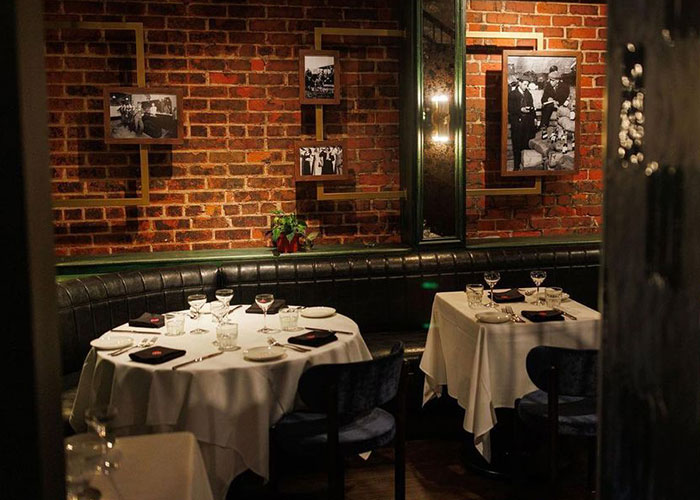





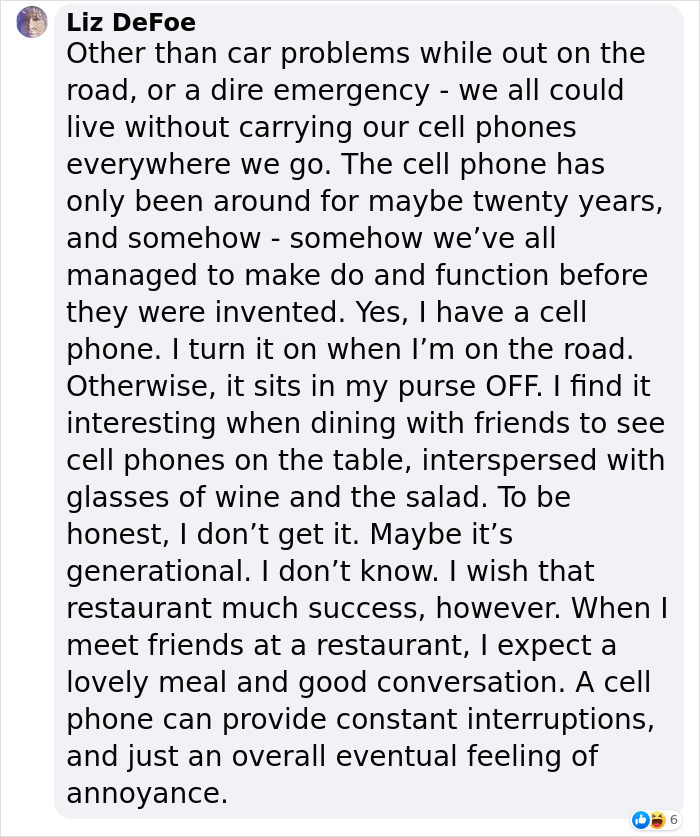
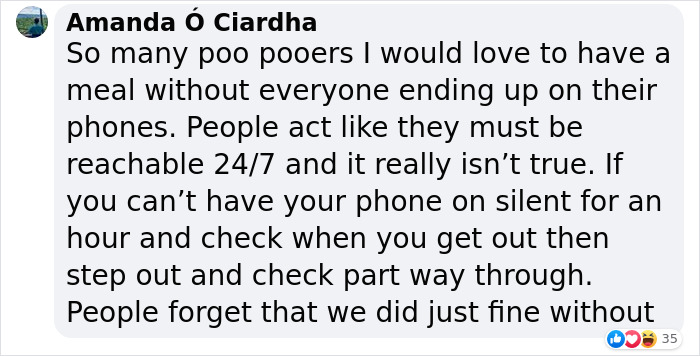


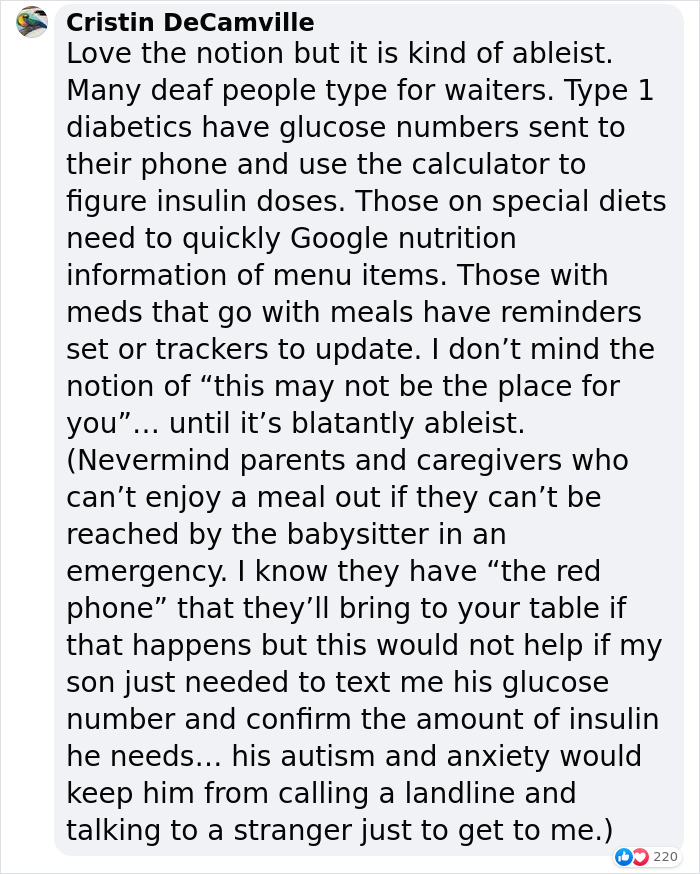
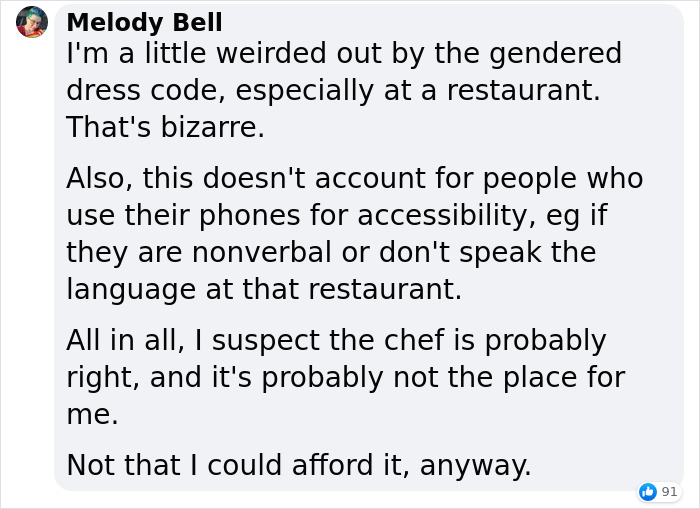
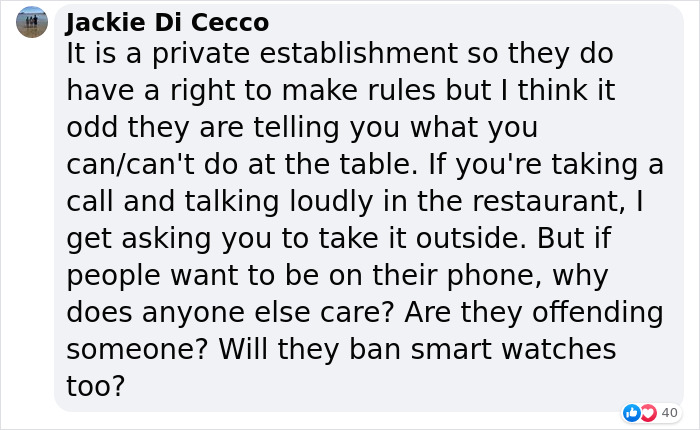
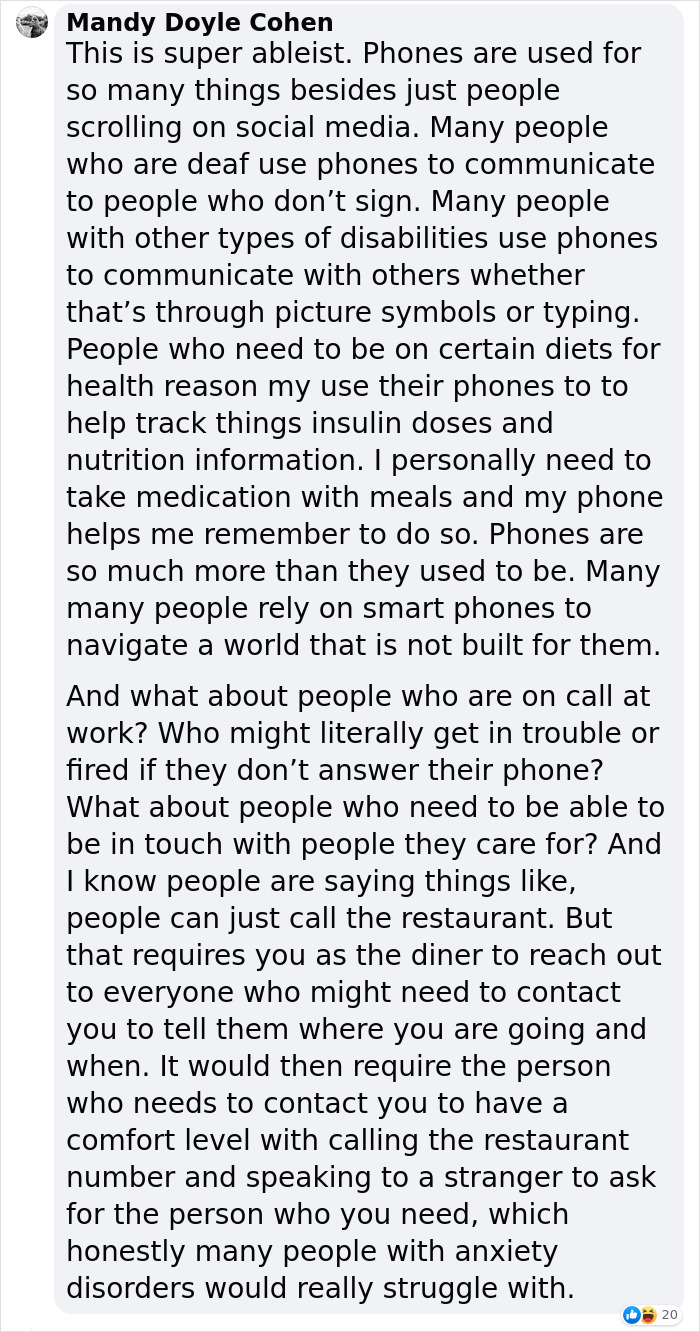

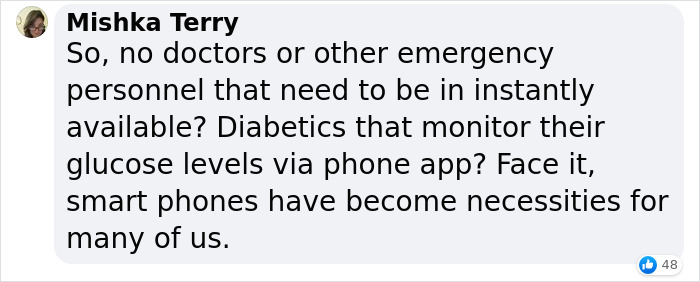

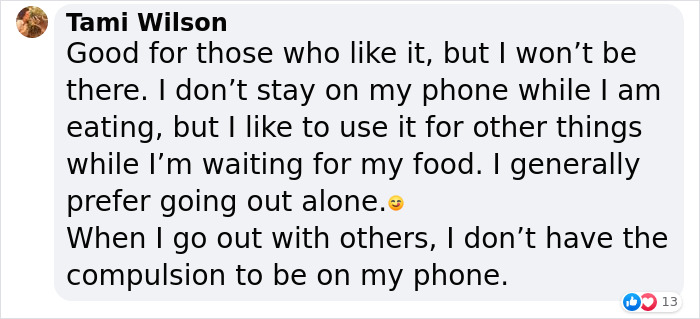



















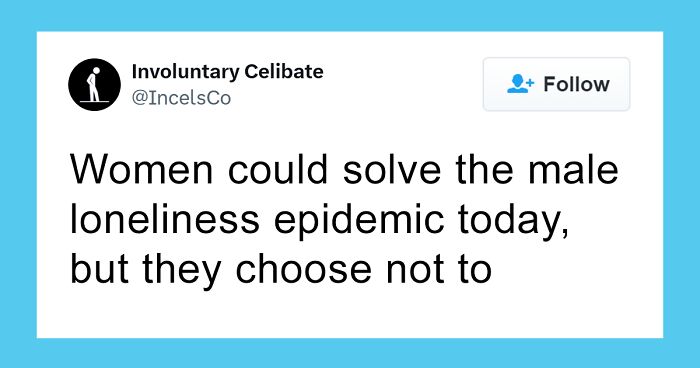


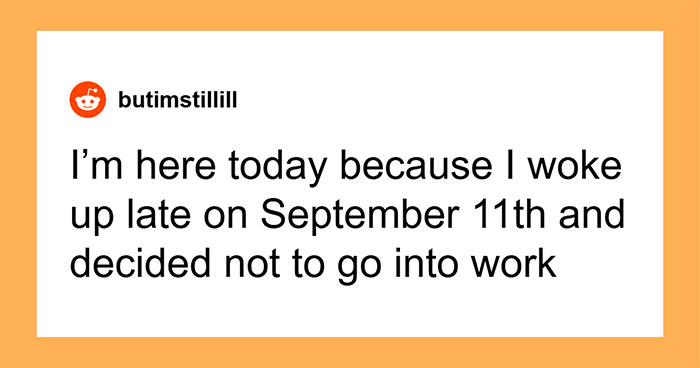

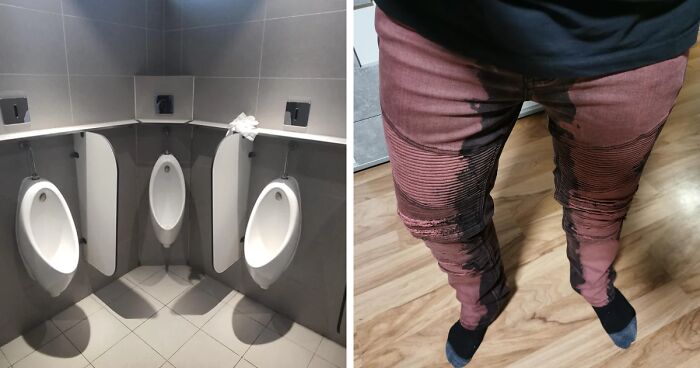


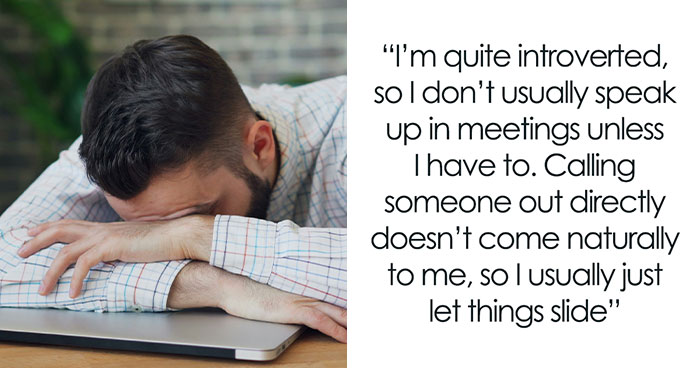















63
52